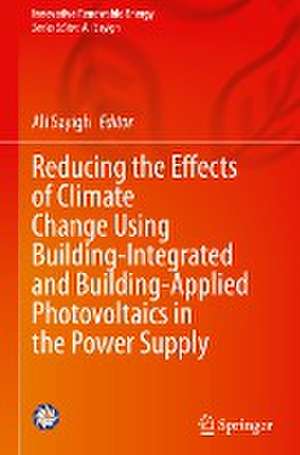Reducing the Effects of Climate Change Using Building-Integrated and Building-Applied Photovoltaics in the Power Supply: Innovative Renewable Energy
Editat de Ali Sayighen Limba Engleză Hardback – 12 ian 2024
Preț: 794.07 lei
Preț vechi: 968.38 lei
-18% Nou
Puncte Express: 1191
Preț estimativ în valută:
151.98€ • 158.07$ • 127.36£
151.98€ • 158.07$ • 127.36£
Carte tipărită la comandă
Livrare economică 13-27 martie
Preluare comenzi: 021 569.72.76
Specificații
ISBN-13: 9783031425837
ISBN-10: 3031425839
Pagini: 431
Ilustrații: VIII, 431 p. 338 illus., 322 illus. in color.
Dimensiuni: 155 x 235 mm
Greutate: 0.79 kg
Ediția:1st ed. 2024
Editura: Springer Nature Switzerland
Colecția Springer
Seria Innovative Renewable Energy
Locul publicării:Cham, Switzerland
ISBN-10: 3031425839
Pagini: 431
Ilustrații: VIII, 431 p. 338 illus., 322 illus. in color.
Dimensiuni: 155 x 235 mm
Greutate: 0.79 kg
Ediția:1st ed. 2024
Editura: Springer Nature Switzerland
Colecția Springer
Seria Innovative Renewable Energy
Locul publicării:Cham, Switzerland
Cuprins
Photovoltaics and the Built Environment in Brazil.- Built Integrated Photovoltaic Application (BIPV): The Dutch Situation.- Building-attached and Building-integrated Photovoltaic Systems in Austria.- Photovoltaic Systems: A Challenge or an Opportunity for the Polish Energy Sector During Its Transformation.- Wind Tunnel Tests for BAPV Installations in Patagonia, Argentina.- Building Applied Photovoltaic Systems in Iran: Opportunities and Challenges.- Massive Growth of PV Capacity as a Major Cornerstone of Germany’s Energy Security and Climate Policies.- Building Integrated Photovoltaic – Thermal System (BIPV) Performance Under the Tropical Climate Conditions.- Design Considerations for BIPV Systems in Oman.- Renewable Energy Options and Built Environment in the Gulf Cooperation Countries Adapting to Combat Climate Change.- Solar Energy Scenario in India.- A Review of Policies, Energy Resources Towards a More Sustainable Economy: A Study on Renewable Energy in India.- High-transparency Clear Glass Windows and Agrivoltaics With Large PV Energy Outputs.- Modelling and Energy Analysis of a Solar Cooling System Powered by a Photovoltaic (PV) System for a Net-zero Energy Building (NZEB) Using TRNSYS-PVsyst.- Photovoltaic Applications in the Built Environment in the UK.- Policies and Trends to Mitigate Climate Change Impacts by Integrating Solar Photovoltaics in Buildings and Cities: Emphasis on Egypt’s Experience.
Notă biografică
Dr. Ali Sayigh is the Chairman and Founder of the World Renewable Energy Congress and Council; Director General of the World Renewable Energy Network (WREN); Chairman and Founder of the Arab Solar Energy Society; and Past Chairman of the UK Solar Energy Society. Dr. Sayigh actively consults on renewable and sustainable energy issues for many international organizations, including UNESCO, ISESCO, UNDP, ESCWA, and UNIDO. Dr. Sayigh was Director of Solar Seminars at ICTP Trieste, Italy, from 1977-1995; Professor of Solar Energy at King Saud, Kuwait, and Reading Universities from 1969 to 1994; and Professor of Engineering at the University of Hertfordshire from 1994 to 2004. He was the founding expert in Renewable Energy at AOPEC. He is a Fellow of the Institute of Energy, a Fellow of the Institution of Engineering and Technology (IET), a Fellow of the Royal Society of Arts, and a Chartered Engineer. Dr. Sayigh has published more than 400 papers and has contributedto and edited more than 30 books. He has been Editor and Editor-in-Chief of several international journals, including Renewable Energy and the International Journal of Environmental Sciences and Technology, and Editor-in-Chief of the reference work Comprehensive Renewable Energy.
Textul de pe ultima copertă
This book looks at the success and continuing potential of photovoltaic (PV) technology in combating climate change by harnessing solar energy through building-integrated (BIPV) and building-applied photovoltaics (BAPV). With PV global capacity soaring from 940 GW in 2021 to 1100 GW in 2022 and projected to reach 1456 GW by the end of 2023, the world is witnessing an unprecedented shift towards renewable energy solutions. Today, no single country exists without some form of PV installation, driven by reduced costs and abundant free sunshine. The book’s chapters delve into the advancements in PV technology, exploring its integration as an essential building material by examining 14 countries and regions – Brazil, The Netherlands, Austria, Poland, Argentina, Iran, Germany, Malaysia, Oman, Bahrain, India, Australia, the United Kingdom, and Egypt – and providing a comprehensive overview of their successful adoption of PV for electricity generation. Whether you’re an architect, builder, engineer, or climate advocate, this vital resource offers insights, international case studies, and a path to a greener future.
- Explores how building-integrated (BIPV) and building-applied photovoltaics (BAPV) can mitigate environmental impact;
- Includes international case studies;
- Offers invaluable insights into the successful implementation of PV technology.
Caracteristici
Explores how building-integrated (BIPV) and building-applied photovoltaics (BAPV) can mitigate environmental impact Includes international case studies Offers invaluable insights into the successful implementation of PV technology













